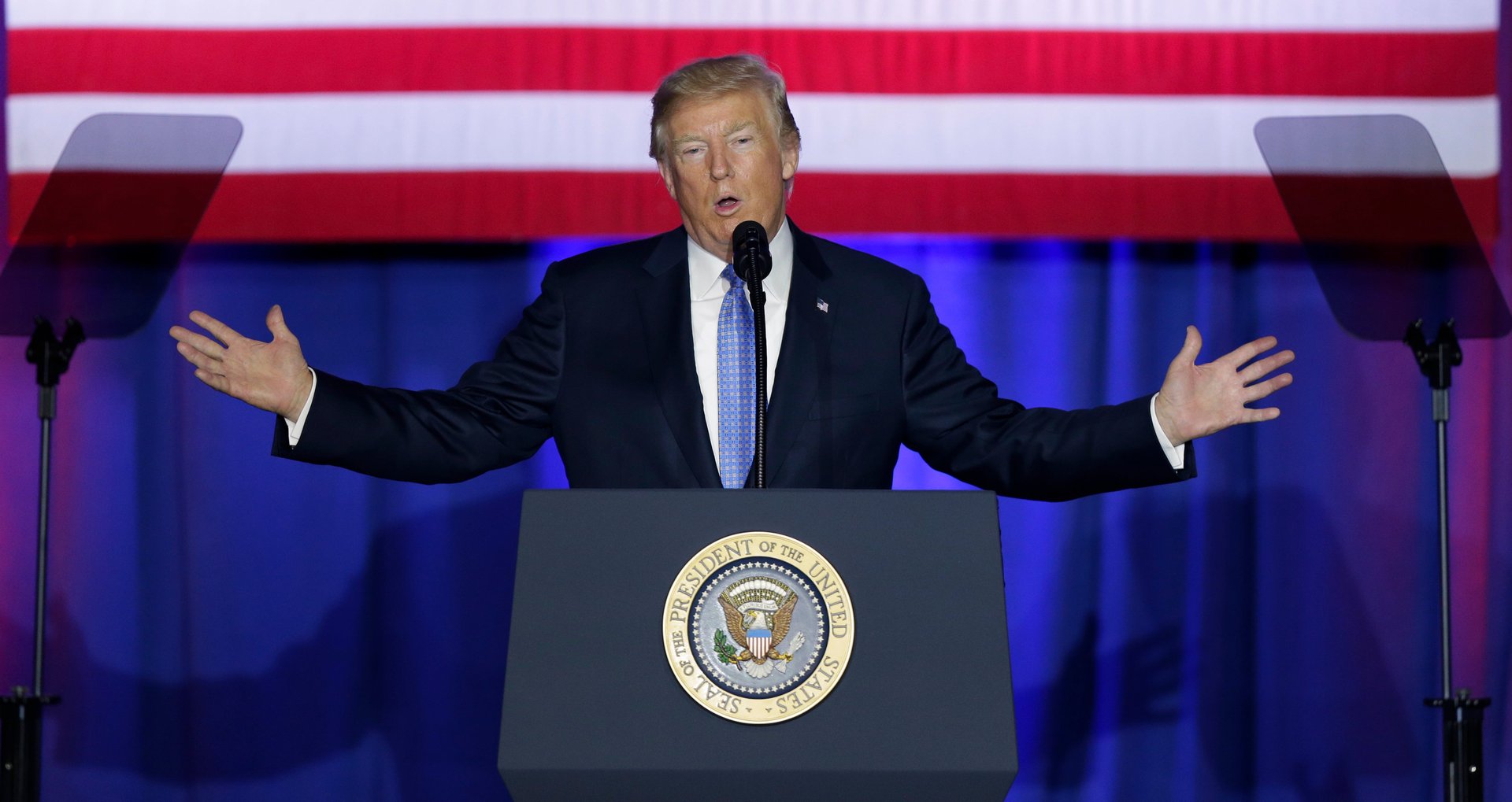Trump’s strategy for selling his tax reform plan is to outright lie about it
The tax reform plan Donald Trump announced yesterday (pdf) is a dream for many of his wealthy Republican backers. It will likely let them keep millions of dollars away from the Treasury by eliminating the alternative minimum tax (which essentially prevents rich people from claiming too many tax breaks) and the estate tax, while slashing the rates rate paid by corporations and by the richest individuals.


The tax reform plan Donald Trump announced yesterday (pdf) is a dream for many of his wealthy Republican backers. It will likely let them keep millions of dollars away from the Treasury by eliminating the alternative minimum tax (which essentially prevents rich people from claiming too many tax breaks) and the estate tax, while slashing the rates rate paid by corporations and by the richest individuals.
It’s not going to work out so well for two other crucial constituencies, however: GOP deficit hawks and Trump’s millions of working-class voters.
How is the administration dealing with the displeasure of these groups? Well, as the New Yorker’s Ryan Lizza points out, by straight-up lying:
In his big announcement speech, Trump framed the reform as “pro-growth, pro-jobs, pro-worker, pro-family.” He mentioned “workers” or “working” people 18 times. “Jobs” came up 20 times.
So desperate is the White House to convince the public that this isn’t a tax cut for the rich that the plan contains an “explicit commitment that tax reform will protect low-income and middle-income households, not the wealthy and well-connected,” Trump said, adding that the wealthy “can call me all they want. It’s not going to help. I’m doing the right thing, and it’s not good for me. Believe me”
Chief economic adviser Gary Cohn was wheeled out to double-down on the line. “The wealthy are not getting a tax cut under our plan,” he told ABC.
That’s simply not true. “This is a huge tax cut for the top 1 percent,” Leonard Burman, director of the non-partisan Urban-Brookings Tax Policy Center, told Bloomberg. “Impossible to square with the president’s rhetoric.” Or, as New York University law professor Lily Batchelder, deputy director of the National Economic Council under Obama, told the New York Times (paywall): “In broad brush strokes, they’re doing nothing for the bottom 35 percent, they’re doing very little and possibly raising taxes on the middle class, and they’ve specified tax cuts for the wealthy.”
Equally false is Trump’s claim that the plan isn’t good for him. Details of his 2005 tax return leaked in March showed he would have saved up to $31.3 million if it weren’t for the alternative minimum tax—which his plan aims to abolish. Meanwhile, nixing the estate tax would one day mean a much prettier inheritance for his offspring.
The administration is being slightly less brazen in pushing its line that the cuts will be revenue-neutral, i.e., won’t increase the budget deficit. Trump only obliquely referred to growing the economy in his speech, but nonetheless said earlier in the week, “it’ll be revenue neutral when you add growth…I think we’re going to rock it in terms of GDP.”
Even conservatives are raising their eyebrows at that claim. The right-wing National Review began a piece titled “An Anti-Growth Tax Cut” with the line: “Republicans want to cut taxes by $1.5 trillion—while the government already is running a deficit—and they propose to offset those cuts with wishful thinking.”
The bipartisan fiscal hawks at the Committee for a Responsible Federal Budget think tank say the plan will add $2.2 trillion to the federal debt.
Howard Gleckman, a senior fellow at the Tax Policy Center, agrees: “It is implausible that this plan would permanently boost the economy. Trillions of dollars in lost revenue would add to the federal debt, raise interest rates, and make it more costly for businesses to invest,” he wrote.
Since the White House pushed consistently for a health-care bill that was deeply unpopular even with Trump voters, chances are it doesn’t care how much the public likes the tax reform bill either. The big question, though, is whether it can get hawkish Republican members of Congress on board. The early signs are that the likes of the hard-right Freedom Caucus, which opposed the health-care reform as not aggressive enough, will not fight this one; the group’s leader, Mark Meadows, is cheering the plan: